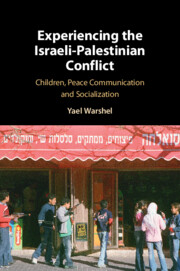‘Yael Warshel outlines with clarity and rigor a new research agenda for evaluating peace communication interventions based on an interdisciplinary understanding of the political context of conflict. Her book is at the same time a rich and fascinating up-close account of the audience reception of Israeli-Palestinian Sesame Street.’
Daniel Hallin - University of California, San Diego
‘Experiencing the Israeli-Palestinian Conflict is a serious achievement, and I suspect it is on its way to becoming one of the most methodologically and theoretically important books in this area. Warshel commands the literature pertaining to children and media, conflict, and peace communication; her call for evidence-based practices applied to the recommendations she poses will reset the direction of the field.’
Donald Ellis
Source: International Journal of Communication
‘[T]he book itself is an excellent model of research design and execution. The mixed methodology and transdisciplinary approach combines peace communication with a semiotic, ethnographic, Cultural Studies approach to the process of communication and textual analysis.'
Jon Simons
Source: The Communication Review
‘Sesame Street serves as one of the most well-studied and prominent children’s television programs we have witnessed in the United States (US). While the global aspirations of this production may reflect noble intentions, the implementation of this communication intervention illustrates the serious fissures in its reception. Learning from failed attempts will lead not only to improving strategic communication, but also will strengthen our ability to engage in meaningful and impactful social change. Warshel’s (Pennsylvania State University) impressive book, Experiencing the Israeli-Palestinian Conflict: Children, Peace Communication and Socialization (2021), offers important reflections on the failure of this project to achieve its goals.’
Karin Gwinn Wilkins
Source: Critical Studies in Media Communication
‘This remarkable study poignantly contrasts the high hopes of the Oslo era, the supposed innocence of young children, and the idealized world of Sesame Street with the ‘mundane, everyday violence’-physical and structural-of the Second Intifada, all vividly illustrated in a model of Geertzian ‘thick description’. […] The book is first and foremost a formidable piece of research. Warshel combines a thorough, methodologically rigorous, and critical evaluation of an ambitious attempt at ‘peace communication’ with what she calls ‘multi-sited ethnographies of violence’ (6)-a portrait of everyday life and intergroup relations in the quotidian towns of Alfei Menashe, Umm El-Fahem, and East Barta’a-all narrated through the drawings, photographs, and reflections of Jewish-Israeli, Arab/Palestinian-Israeli, and Palestinian children aged 5-8.’
Ned Lazarus
Source: Israel Studies Review
‘Yael Warshel’s scholarly contribution cannot be mistaken.’ ‘This book provides a model for researchers who want to tackle important issues through applied methods. The author provides a guide for future PeaceComm studies by carefully describing the actions taken by herself, the choices made by producers and viewers, and lessons learned.’ ‘Studying conflict interventions provides valuable lessons for current/future conflicts …’ ‘The application spans several years, borders, and methods.’ ‘This book deserves recognition as among the best the National Communication Association’s Applied Communication Division has produced.’ ‘This is a fascinating book.’ ‘This unflinching, carefully detailed study shows great intentions and expense yielding none of three intended effects because the viewers … were grounded in the reality of the Palestinian/Israeli separation. The ‘two street solution’ meant to bring characters on [Palestinian and Israeli] Sesame Street together were unconvincing.’ ‘I can't think of a more well researched book that details a spectacular failure.’
Source: NCA Sue De Wine Award Jury
‘‘a very important book’ ‘A wonderful book and valuable addition to the literature.’ ‘a pleasure to read’. ‘Very rich and descriptive ethnographic data.’ ‘The amount of field work and work with the communities is amazing and the depth of the book is also great.’ ‘Very well written, an amazing history and comprehensive analysis of perceptions of Sesame Street among young Palestinian and Israeli children.’ ‘The process of research and impact of Peace Comm is very well crafted and developed in a very interesting way. This book creates a strong foundation for a newish field such as Peace Comm’.’
Source: ISA ICOMM Book Jury Panel
‘[The book] gives clear recommendations on how to better participate in communication ethics issue[s] through peace communication … The author is clearly an expert in the topic … This book achieves a new contribution to the field as we focus on children and their potential to [put an] end to one of the world’s most prominent conflicts.’
Source: NCA Book of the Year Award in Ethics



